As the planet grapples with the manifestation of climatic tumult, the discourse surrounding “climate change” has burgeoned with a panoply of terminologies, each evoking distinct connotations and ideological ramifications. In the Christian context, exploring the lexicon associated with environmental shifts unveils a rich tapestry of rhetoric that is intertwined with theological insights, ethical imperatives, and moral obligations. Through this exploration, one might consider the phrase “creation care” as an alternative yet resonant term for climate change, encapsulating not merely the scientific phenomena but also the profound theological and ethical dimensions associated with our stewardship of God’s creation.
The term “climate change” itself denotes a multifaceted global phenomenon characterized by alterations in temperature, precipitation patterns, and ecological systems. However, this phrase often engenders dichotomous perceptions, particularly within Christian circles. For some, “climate change” signifies a contentious political issue, mired in debate and skepticism, while for others, it represents an urgent moral dilemma that transcends political affiliations. It compels believers not only to acknowledge the scientific realities but also to engage with the biblical narratives that advocate for environmental stewardship.
One fascinating aspect of linguistic evolution is how terminology shapes public perception. For instance, the phrase “global warming” was often met with resistance; its evocative implications bore a sense of urgency that some sectors wielded as either a rallying cry or a reason for dissent. The term likely conjures images of sun-kissed landscapes that transform into parched earth—an imagery powerful enough to evoke a visceral response. Conversely, identifying the phenomenon through the prism of “creation care” shifts the conversation from one of fear and alarm to a narrative embedded in love, responsibility, and hope.
This reframing can be likened to a parable—subtle yet transformative. The Christian ethos emphasizes the intrinsic value of all creation, heralding the principle that God not only created the heavens and the earth but entrusted humanity with the nurturing of that creation. The metaphor of a caretaker springs to mind; God as the original gardener, cultivating a rich and vibrant Eden, with humanity tasked to tend its heart. Thus, to frame environmental concerns through the lens of “creation care” positions believers as active participants in God’s ongoing work, rather than passive observers of rapid change.
Importantly, this shift in terminology also invites contemplation about the sanctity of life and the interconnected nature of all beings. The narrative woven into “creation care” underscores our role in preserving ecosystems, which are often viewed as mere commodities in secular discourse. When Christians advocate for ecological respect using this terminology, they infuse the issue with an inherent value system—one that is steeped in a conviction of divine creativity and an understanding of our role in honoring that creation.
The rhetoric surrounding climate change and its various terminological avatars often reflects underlying theological dichotomies. For instance, some segments of the Christian community may align with a worldview that prioritizes economic growth over environmental health. This can lead to a perception of ecological advocacy as a limitation on human progress. However, when the conversation is shifted towards “creation care,” advocates can better articulate a vision where environmental preservation and human flourishing are intertwined. Resources can be viewed not simply as wealth to be accumulated but as gifts to be stewarded, cultivated with gratitude.
This theological reinterpretation becomes especially salient in light of the encyclicals and teachings from various church authorities. From Pope Francis’ “Laudato Si’,” which calls for an integral ecology informing social justice, to the teachings of Protestant denominations that resonate with environmental justice, the scriptures are replete with mandates that imbue environmental responsibility with spiritual significance. This connective tissue between faith and ecology lends credibility to the discourse, enabling believers to advocate for ecological principles rooted in cherished texts, like Genesis 2:15, which implores humanity to “work and take care of” the Garden.
Moreover, the integration of terms like “climate justice” into the conversation around climate change has catalyzed a broader awareness of the ethical ramifications of ecological degradation, particularly on marginalized communities. In this regard, public perception has begun to pivot. No longer is environmental concern confined solely to elite circles; the urgency resonates with grassroots movements led by faithful communities striving for justice and equity. The Christian teachings on loving one’s neighbor dovetail with the call to protect the most vulnerable from the adverse consequences of climatic disruptions.
The rhetoric that surfaces in discussions about climate change thus encapsulates a complex interplay of fear, hope, moral obligation, and faithful stewardship. Emerging terminologies provide not only a framework for understanding the pressing issues at hand but also reconstruct a narrative that embodies the complexities of faith and ecological concern.
In contemplating the road ahead, Christians are equipped to lead conversations that don’t solely dwell on doom and gloom but invite congregations to embrace a vision of renewal—one that acknowledges the need for urgent action while offering a glimmer of hope rooted in divine providence and the assurance of God’s presence in creation’s restoration. By adopting “creation care” within the rhetorical arsenal, the faithful can transcend polarizations, ultimately fostering a more holistic dialogue on climate realities that honors both the Creator and the wondrous creation bestowed upon us.
Thus, as we navigate the changing climate, let us strive to reshape public perception through thoughtful engagement, grounded in faith-derived responsibility—endeavoring to protect an Earth that is not merely ours to use, but a sacred trust we are called to cherish and sustain.



